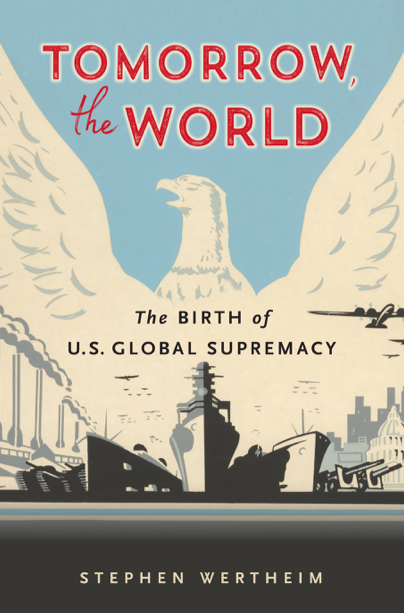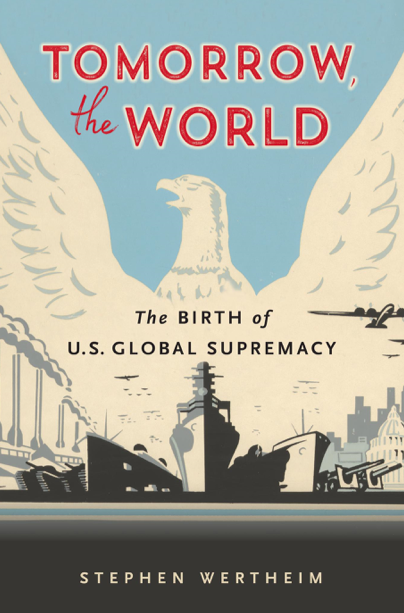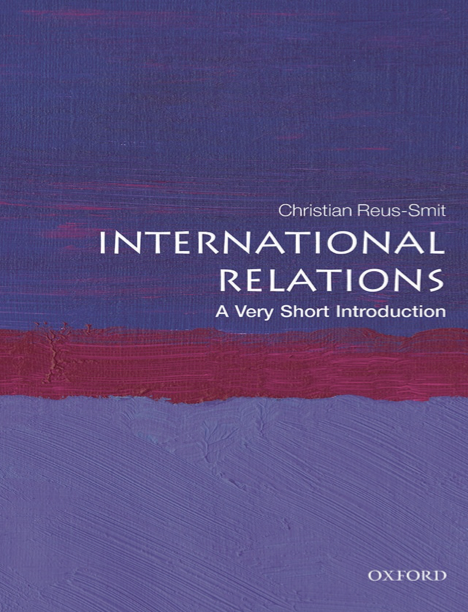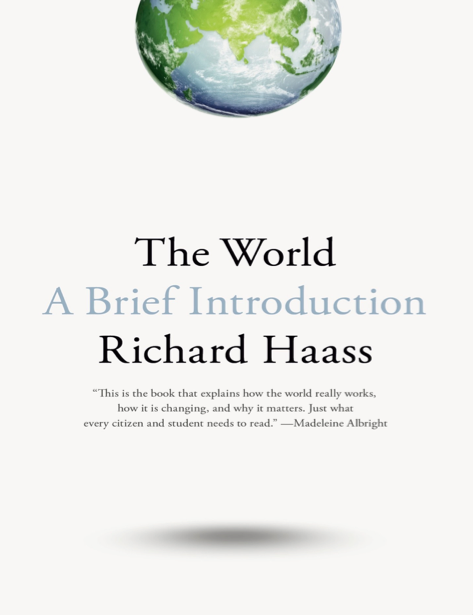Tomorrow, the World: The Birth of U.S. Global Supremacy | Stephen Wertheim
![]()
![]()
Stephen Wertheim Globalization & Politics World War II History International & World Politics Globalization International Relations Politics & Government Politics & Social Sciences Foreign Affairs Best Book of the Year
- درباره کتاب
- مطالعه راحت
- بخشی از کتاب
- نظرات
A Foreign Affairs Best Book of the Year
A new history explains how and why, as it prepared to enter World War II, the United States decided to lead the postwar world.
For most of its history, the United States avoided making political and military commitments that would entangle it in European-style power politics. Then, suddenly, it conceived a new role for itself as the world’s armed superpower―and never looked back. In Tomorrow, the World, Stephen Wertheim traces America’s transformation to the crucible of World War II, especially in the months prior to the attack on Pearl Harbor. As the Nazis conquered France, the architects of the nation’s new foreign policy came to believe that the United States ought to achieve primacy in international affairs forevermore.
Scholars have struggled to explain the decision to pursue global supremacy. Some deny that American elites made a willing choice, casting the United States as a reluctant power that sloughed off “isolationism” only after all potential competitors lay in ruins. Others contend that the United States had always coveted global dominance and realized its ambition at the first opportunity. Both views are wrong. As late as 1940, the small coterie of officials and experts who composed the U.S. foreign policy class either wanted British preeminence in global affairs to continue or hoped that no power would dominate. The war, however, swept away their assumptions, leading them to conclude that the United States should extend its form of law and order across the globe and back it at gunpoint. Wertheim argues that no one favored “isolationism”―a term introduced by advocates of armed supremacy in order to turn their own cause into the definition of a new “internationalism.”
We now live, Wertheim warns, in the world that these men created. A sophisticated and impassioned narrative that questions the wisdom of U.S. supremacy, Tomorrow, the World reveals the intellectual path that brought us to today’s global entanglements and endless wars.
Editorial Reviews
Review
“You really ought to read it…It is a tour de force…While Wertheim is not the first to expose isolationism as a carefully constructed myth, he does so with devastating effect. Most of all, he helps his readers understand that ‘so long as the phantom of isolationism is held to be the most grievous sin, all is permitted.’”―Andrew J. Bacevich, The Nation
“For almost 80 years now, historians and diplomats have sought not only to describe America’s swift advance to global primacy but also to explain it…Any writer wanting to make a novel contribution either has to have evidence for a new interpretation, or at least be making an older argument in some improved and eye-catching way. Stephen Wertheim’s Tomorrow, the World does both…[An] estimable book.”―Paul Kennedy, Wall Street Journal
“The only recent book to explore U.S. elites’ decision to become the world’s primary power in the early 1940s―a profoundly important choice that has affected the lives of billions of people throughout the globe…Contributes to the effort to transform U.S. foreign policy by giving pro-restraint Americans a usable past. Though Tomorrow, the World is not a polemic, its implications are invigorating…Wertheim opens space for Americans to reexamine their own history and ask themselves whether primacy has ever really met their interests.”―Daniel Bessner, New Republic
“In writing the history of the country’s decision to embrace a militarist vision of world order―and to do so, counterintuitively, through the creation of the United Nations―Wertheim provides an importantly revisionist account of U.S. foreign policy in the 1940s, one that helps us think anew about internationalism today…The contemporary stakes of Wertheim’s work are plainly apparent…A reminder of just how strange it is that Americans have come to see military supremacy as a form of selfless altruism, as a gift to the world.”―Sam Lebovic, Boston Review
“Wertheim delves into an important bit of history to try to pinpoint exactly when and why the United States embraced the global military supremacy that Americans have taken for granted for decades…He is on [firm] ground in arguing that today U.S. global military dominance has outlived its original purpose.”―Jessica T. Mathews, Foreign Affairs
“Stephen Wertheim isn’t only a great historian of American foreign policy. He uses history to offer a critique of American foreign policy that Americans desperately need now.”―Peter Beinart, author of The Icarus Syndrome
“How did the United States acquire the will to lead the world? How did primacy come to be the natural posture of America’s policy elite? In this groundbreaking new history, Stephen Wertheim overturns our existing understanding of the emergence of American global dominance. A work of brilliantly original historical scholarship that will transform the way we think about the past, the present, and the future.”―Adam Tooze, author of Crashed
“Americans now believe global leadership is their birthright; this splendid book uncovers the origins of that conviction. Wertheim’s detailed analysis of strategic planning before and during World War II shows that the pursuit of global primacy was a conscious choice, made by a foreign policy elite that equated ‘internationalism’ with the active creation of a world order based on U.S. military preponderance. Myths about the seductive dangers of ‘isolationism’ helped marginalize alternative perspectives, leaving armed dominance and military interventionism as the default settings for U.S. foreign policy. A carefully researched and beautifully written account, Tomorrow, the World sheds new light on a critical period in U.S. history and reminds us that internationalism can take many different forms.”―Stephen M. Walt, author of The Hell of Good Intentions
“How did the idea of American military supremacy come to be understood as essential and inevitable? In this important and beautifully crafted revisionist history, Stephen Wertheim shows the way a foreign policy consensus in favor of American predominance was forged as Hitler ransacked Europe. It became an assumed necessity after World War II, and later fueled military build-up and ongoing armed conflict. By revealing the contingent path of American global militarism, Wertheim makes an urgent and overdue reassessment possible.”―Mary L. Dudziak, author of War Time
“The Trump and Biden administrations have seen a sharp shift away from the United States’ desire to be the preeminent power in the world. But how did it get there in the first place? In painstaking detail, Wertheim draws the battle map of intellectual warfare that went on during World War II between U.S. thinkers who wanted the United States to continue the tradition of British preeminence and those who didn’t.”―Jack Detsch, Foreign Policy
“Not only a sharp and well-argued historical analysis of American foreign policy, but also a persuasive political argument about America’s place in the world today…The rise of the American Empire was not facilitated by ‘absent-minded’ policy makers. Instead, the drafters of the plan were very much aware of their own ambitions while not necessarily sharing them with the wider public…An exceptionally readable blend of intellectual history, foreign policy and international theory.”―Or Rosenboim, Journal of Strategic Studies
“Wertheim…details the thinking behind America’s pursuit of global dominance from the 1940s to the present day in this impeccably researched debut history…This fine-grained account sheds new light on an era and a worldview too often obscured by gauzy patriotism.”―Publishers Weekly
“Wertheim provides an important historical corrective to the notion that the United States sleepwalked into global supremacy…An important read.”―Charles Dunst, LSE Review of Books
“Excellent…An important contribution to the history of U.S. foreign policy, and it is also relevant to contemporary debates about the proper U.S. role in the world.”―Daniel Larson, American Conservative
“Even readers who question Wertheim’s premises or differ from him on current policy will find much to learn in a concise, jargon-free study grounded on careful research.”―William Anthony Hay, Law & Liberty
“One does not need to be universally opposed to all of American policy since the Second World War to see the immense value of this book in showing the ideological lineage we have inherited that distorts how we talk about Grand Strategy through the present.”―Christopher Mott, Global Security Review
“In the wake of [WWII], decision makers regarded military restraint not as a virtue but as a recipe for chaos. Intervention was seen as inevitable, and isolationism became a dirty word. Politicians debated particular engagements, but they rarely questioned America's role as global cop…But as Wertheim reminds us, foreign policy elites chose to take on this role, and they can choose to leave it behind.”―Fiona Harrigan, Reason
“A stimulating revisionist view that sees the move to world dominance as a conscious choice.”―Choice
About the Author
Stephen Wertheim is Senior Fellow in the American Statecraft Program at the Carnegie Endowment for International Peace. He is also Visiting Faculty Fellow in the Center for Global Legal Challenges at Yale Law School. His writing has appeared in Foreign Affairs, Foreign Policy, New York Review of Books, New Yorker, New York Times, and Washington Post.
با وجود اینکه هنوز بسیاری از کتابخوانها [ی حرفهای] ترجیح میدهند از کتاب چاپی برای مطالعه استفاده کنند ولی شمار کتابخوانهایی که بهتدریج از کتاب الکترونیک به عنوان مکمل یا منبع اصلی مطالعه استفاده میکنند کم نیست. فارغ از نوآوریهای جالبتوجه در زمینهی کتابخوانهایی همانند Kindle کمپانی آمازون، امکان و قابلیت نرمافزاری ساده، کارآمد و در دسترس مطالعهی کتاب با فرمت ePub از نظر بسیاری از کتابخوانها دور مانده است؛ بر اساس تجربهی مستقیم ما، شاهد بودهایم که بسیاری از افرادی که به صورت حرفهای به دنبال کتابهای زبان اصلی برای مطالعه روی کامپیوتر، تبلت و موبایل خود هستند با فرمت ePub آشنایی درستی ندارند.
پر واضح است که لمس کتاب بهصورت فیزیکی و بوی خوش کاغذ تجربهای لذتبخش و بیمانند است که همچنان در بین کتابخوانهای حرفهای در سراسر دنیا هواداران بسیاری دارد. البته، وقتی یکی از دغدغههای کتابخوان سهولت مطالعهی کتاب تحت هر شرایطی باشد اینجاست که نیاز به استفاده از کتاب الکترونیک حس میشود. با توجه به ویژگیهای مناسب کتابهای الکترونیک با فرمت ePub نگرانی ضعیف شدن بینایی و خستگی چشم بر اثر نگاه مستقیم به صفحهی نمایش تا حد بسیار زیاد و قابلتوجهی کاسته میشود.
کتاب الکترونیک با فرمت ePub این قابلیت را به خواننده میدهد تا بتواند رنگ زمینه، نوع فونت و سایز فونت را برای مطالعهی کتاب خود انتخاب کنند. همچنین خواننده این امکان را دارد که روی نوشته یادداشت بنویسد، جملهای را هایلایت کند و یا صفحه یا صفحاتی از کتاب را بوکمارک کند.
خوشبختانه نرمافزارهای کتابخوان الکترونیکی رایگان بسیاری وجود دارد که از فرمت PDF و ePub پشتیبانی میکنند. این کتابخوانهای الکترونیک قابل نصب روی انواع موبایلهای اندرویدی، آیفون، لپتاپهای ویندوزی و مکبوک است.











هنوز نظری ثبت نشده
اولین نفری باشید که نظر میدهید
ثبت نظر